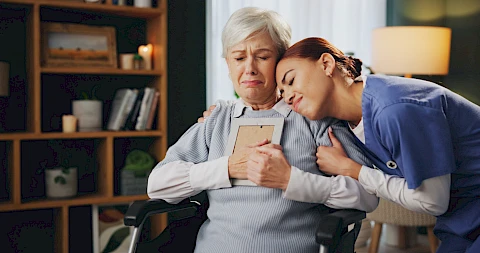
Life is a journey filled with change. Significant transitions for seniors, like retirement or losing a loved one, can be particularly challenging emotionally. These changes can disrupt daily routines and have a profound impact on mental health. Understanding how to navigate these transitions effectively is crucial. Our team has tips for seniors and their families on maintaining well-being during these transitions in the golden years.
Common Life Changes for Seniors
Retirement can be a bittersweet transition. While it offers the freedom to pursue new interests, it can also lead to feelings of loss and uncertainty. Adjusting to a significantly different daily routine can be challenging.
The loss of a loved one is a harrowing experience for many seniors. Grief can be overwhelming and affect emotional well-being.
Health concerns and mobility limitations are common challenges as we age. These changes can impact independence and self-esteem. Relocating to a new home or moving into an assisted living facility can be emotionally taxing as seniors adjust to unfamiliar surroundings.
Emotional Reactions to Change
Grieving the loss of loved ones, cherished routines, or physical abilities is a natural response. However, prolonged sadness can significantly impact the quality of life. Uncertainty about the future, particularly during health-related changes, can cause anxiety and fear. Seniors need to manage these emotions to prevent them from overshadowing daily life.
Social connections may dwindle after retirement or the loss of close companions, leading to feelings of isolation and loneliness. Work and family roles often provide a sense of identity and purpose. Significant changes can make seniors feel purposeless, impacting self-esteem and motivation.
Strategies for Coping
Are you a senior looking for ways to cope with these changes? Or a family member hoping to support your senior loved one? Here are some strategies to help manage the feelings associated with these changes and help maintain a senior's well-being.
Seeking Support
Reaching out to family, friends, or neighbors can bring comfort and lessen feelings of loneliness. Support groups offer a platform to share experiences and receive emotional support from those who understand similar challenges. Seeking professional help can provide tools to cope with intense emotions.
Practicing Self-Care
Regular physical activity boosts mood and improves health. Walking, dancing, or yoga can be both enjoyable and beneficial. Always consult with your doctor before starting a new exercise routine.
A nutritious diet also supports physical and mental health. Consuming balanced meals rich in fruits, vegetables, and lean proteins can make a difference.
Meditation, deep breathing, or gentle stretching can reduce stress and promote relaxation.
Finding New Purpose
- Hobbies: Rediscovering old passions or exploring new hobbies can bring joy and a sense of achievement.
- Volunteering: Helping others can be fulfilling and provides opportunities for social interaction.
- Lifelong learning: Enrolling in classes or learning new skills keeps the mind active.
Resources for Mental Health Support
Several local mental health services are available to provide immediate and long-term assistance. Hotlines offer compassionate support for urgent needs. Local senior centers often host various activities and programs to encourage social connections and support. The internet provides many platforms where seniors can find information, participate in virtual support groups, and connect with others.
Are You Coping With Big Changes in the Senior Years?
Navigating the emotional impacts of significant life changes is essential for seniors' well-being. Acknowledging these challenges and seeking appropriate help is the first step towards managing them.
Contact us if you or a loved one in Bunnell, Flagler, St. Johns, Volusia County, or St. Augustine need support during these transitions. Senior Helpers Palm Coast offers seniors compassionate and professional assistance in a new life chapter.